Down Mexico Way
We were stopped by soldiers with automatic weapons slung over their shoulders. They came up with a plastic bucket and were taking donations to support a political candidate. Not contributing seemed like a bad option when the soliciting party was armed. $10 got us on our way into the mountains.
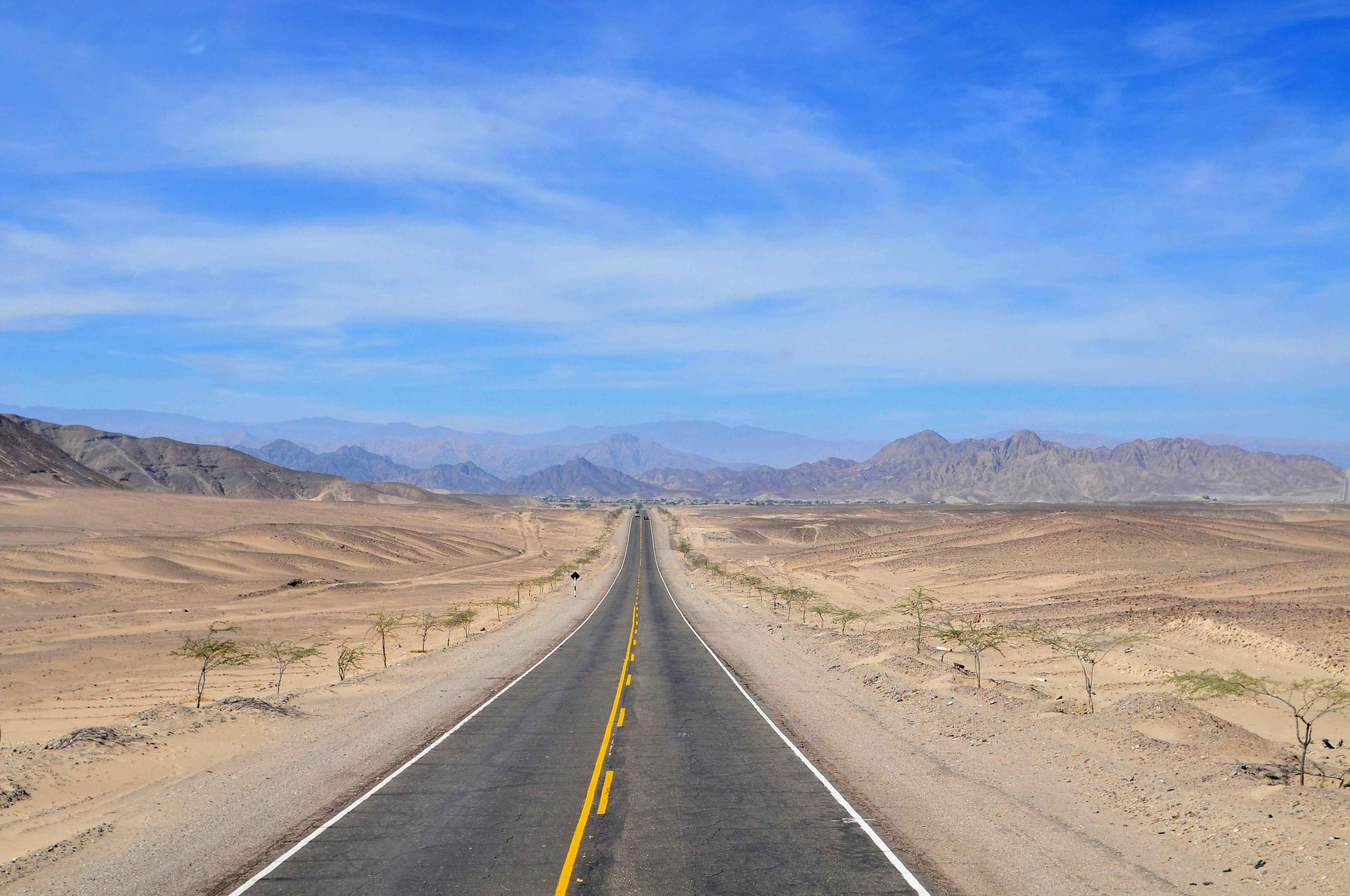
We were about a half-hour south of the visa checkpoint when Will stepped down on the accelerator and his 1968 Oldsmobile seemed to rise off the shocks. The Pan American Highway was distractingly straight for close to one hundred miles between Nuevo Laredo and Monterrey but there were chunks of chip seal missing and engineered dips in the roadbed to drain the arroyos and Will did not slow as these moved into his view. I leaned over and saw the speedometer showing 90 miles per hour as the heavy chassis rose a foot or two into the air after we passed over broken pavement.
“Hey, Will.” I tried to sound nonchalant, but I was frightened. “There’s a cantina up here a few miles on the right. I love their pickled eggs. Let’s stop and get something to eat.”
“Sure partner. Sounds like a good plan.” He looked over at me in the passenger seat and smiled as if he smelled my fear and was enjoying my anxiety.
My bride of just two years, Mary Lou, my mother, down from Michigan, and Will’s wife, Barbara, were sitting in the back seat. I had heard them chatting the first hour but as the car sped faster across the Mexican distance, they had grown quiet.
“How much farther, pard?” Will had reached under the driver’s seat and pulled out a flask, twisted the top with one hand, and took a deep swig while holding the wheel with his other and looking down his nose toward the highway.
“Just there,” I said. “See that dirt road up the hill?”
We were upon the turn almost as quickly as I had finished my sentence. Will steered us up the steep incline with gravel spinning out behind the tires. I was relieved to get him off the road and intended to get his keys to drive the remaining three hours.
The morning had an ignominious start. The idea for the trip had been Will’s. I had been to Monterrey to cover the visit of the Pope for our Laredo television news outlet, and he had been enamored of the adventure. Will had come down from Houston to anchor our local newscast and had not yet been to Mexico. I told him about the hotel where I had stayed on the plaza and the French cuisine restaurant across the street, and he was seemingly entranced. When my Ma came by the TV station, he brought up the idea with her, and victimized by his charms, she became an enthusiastic participant in the planning. Her second visit to Texas would be made more memorable by crossing the border.
The agenda had been to meet at Will and Barbara’s apartment at 7 a.m. and get across the international bridge before weekend traffic began the backup. When I knocked on the door, there was no answer. I kept knocking and after several minutes Will swung it open to reveal himself looking sleep wrinkled in his bathrobe. Barbara stood behind him, expectant.
“Uh, Will, we did say seven o’clock, didn’t we?”
“Yeah, yeah, I’m sorry, pard. Went at it a little hard last night. Where are your girls?”
“Waiting down in the car.”
“Ah, go get ‘em. I’ll shower up fast and Barb and I can be ready in minutes.”
Mary Lou and Ma came up the stairs into the dark living room of the apartment. In the kitchen, not far from where I was standing, Will was pouring milk into a 16-ounce tumbler. His hair stood on end almost as if he had put his finger in an electrical socket or had been struck by lightning. While the girls were making small talk before Barb went back to get ready, I noticed Will had filled his glass only half full of milk but was not drinking. He looked over at me, grinned, and grabbed a bottle of scotch and filled the other eight ounces of his tumbler with the alcohol.
“Bottoms up,” he said, tilting the glass to his mouth and chugging the entirety of the drink without stopping.
“Damn, Will,” I said. “Hell of a way to start your day.”
“Gotta get the motor runnin’ for our big adventure, don’t I?”
In the car an hour later, we moved through Nuevo Laredo past the plaza and the old market and south by the sad dirt side streets to the open country. A lingering drought had turned the plains brown but there was a veil of green in the low mountains to our west. Mary Lou and I had begun exploring Northern Mexico in our little Chevette and had driven up into the village of Bustamente for a weekend. We spent a night in an old stone hotel and ate and drank at cafes on their small plaza with the mountains crowding up next to the pastel adobe houses down the avenue.
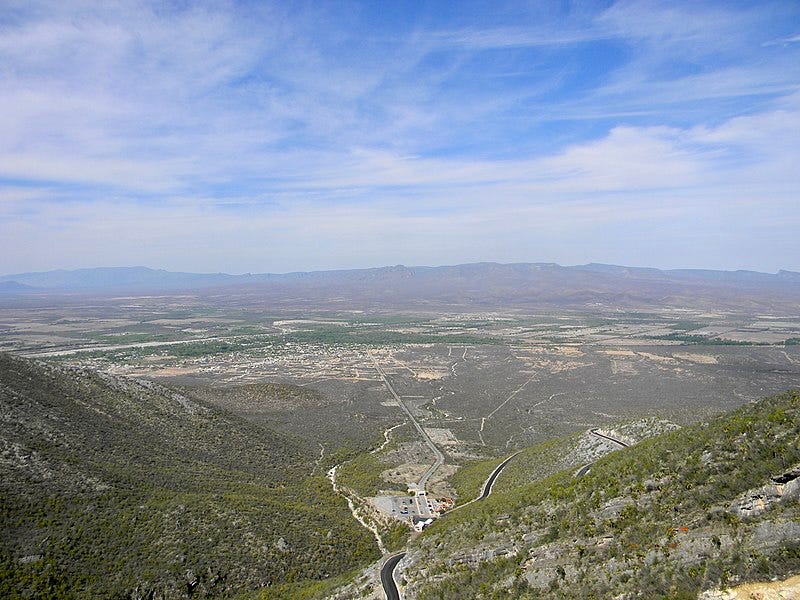
We sometimes sat on the steps on the back of the single-wide trailer we rented on a ranch near the Rio Grande, and we were able to see mountains marking the horizon on clear days. I did not know there was alpine terrain in reasonable driving distance from the border and we decided to go wandering to see how far away they were and if we might find any towns or villages to visit. On our way up to Bustamente, which was almost four hours south of Nuevo Laredo, we were stopped by soldiers in khaki uniforms with automatic weapons slung over their shoulders. A rope had been pulled across the road and the soldiers came up to my window with a plastic bucket and were taking donations to support a political candidate. Not contributing seemed like a bad option when the soliciting party was armed. Ten dollars got us on our way further into the mountains.
“Son, I never even heard of pickled eggs,” my Ma said. “They didn’t even have those in Mississippi when I lived down there.”
“I hadn’t either, Ma, but I liked ‘em first time I tasted ‘em.”
The bartender screwed the top off a gallon glass jar and reached in with tongs and took out a half dozen eggs and put them on a couple of paper plates. We each took one and ate, my mother more tentatively than the rest. As obsessed as she was with sweets, I had expected the twisted up facial expression that arrived after the first bite. Will had the extra one and washed it down with his third beer in the 20 minutes we had been sitting the bar stools and staring across the Mexican brush country. He had tossed his car keys on the bar, and I reached over and casually picked them up.
“Why don’t you keep enjoying yourself, amigo, and I’ll drive?” I asked. “I’ve been this way a few times already and I’m a better driver than navigator.”
Will was mid-morning drunk, but he still gave me a look that insinuated I needed to maintain a respectful distance.
“I’ll go along with that for now,” he said.
Any hint of me being judgmental might ruin the trip. Will never spoke of his drinking, but it was no secret to any of us he worked with at the TV station. Almost daily, when he arrived for his afternoon and evening shifts anchoring the news, I’d run into him in the parking lot standing next to the open trunk of his car, South Texas heat in ribbons rising off the tarmac where he had parked. Only a modest effort was made at discretion as he poured cognac into his coffee thermos to take to his desk in the newsroom.
We often stood in the shade of the TV studio building while he sipped his coffee and drew in great, deep breaths of smoke from his unfiltered Camel cigarettes. Will was half Cherokee with a complexion darker than olive and his eyes were still bright and interested in what he was seeing. I suppose there was something broken in there or an unspoken pain, but I never got a hint at any emotional wounds. He had been the weekend anchor on the news in Houston and I assumed something had gone wrong that led him to a job in Laredo. I was never able to determine what his professional difficulties might have been, but my guess was they were somehow related to cognac in his coffee.
“Will, why don’t you come around back?” my Ma asked. “We’re having our pictures taken with a donkey that wandered up.”
“Probably a wild burro, Ma,” I said. “Just don’t frighten it.”
“Okay, son. It’s sure a cute thing. Will?”
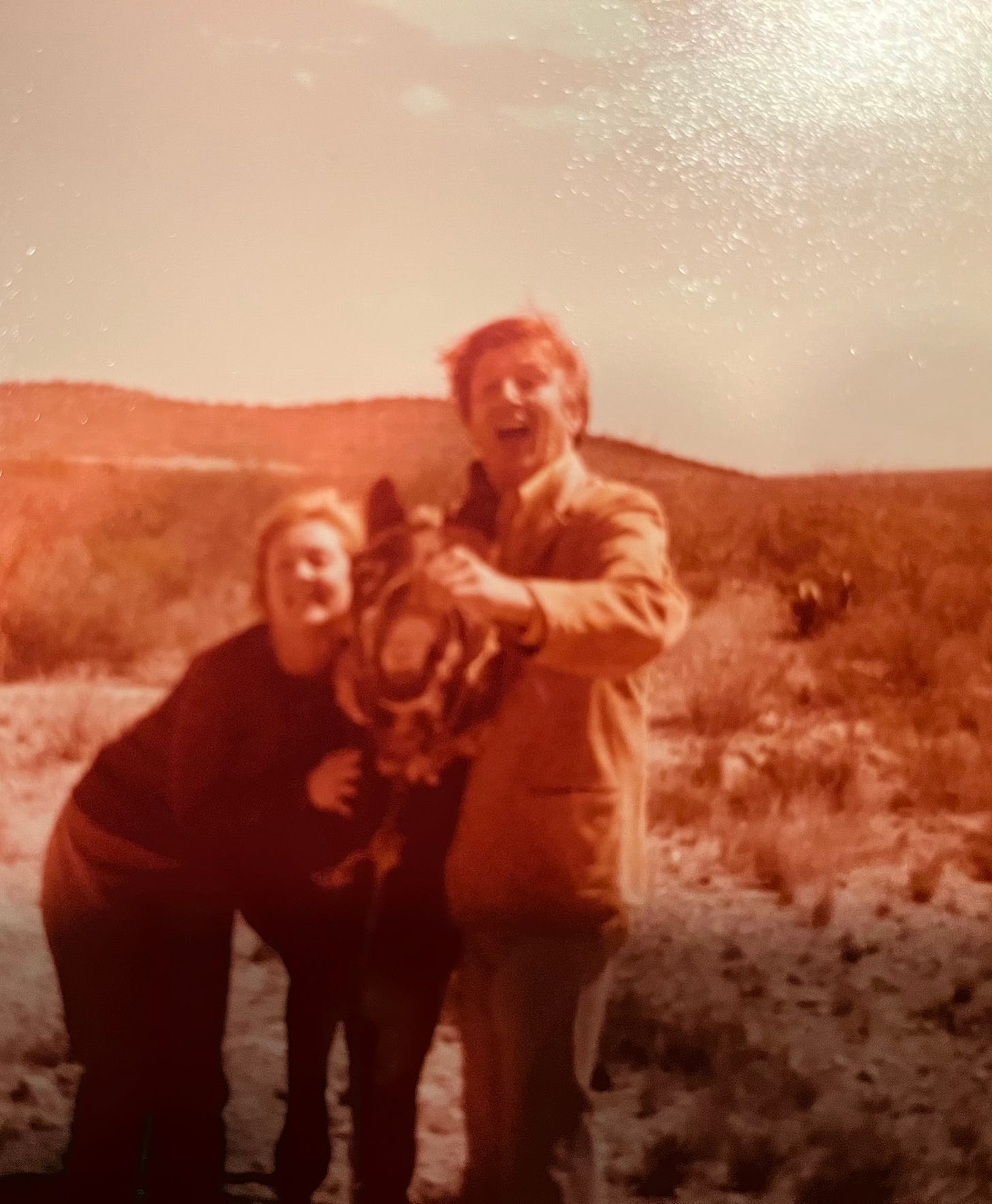
I did not know what to make of my long-divorced mother being drawn to my colleague. Even though she was close to a decade older, I guess it made sense she would be attracted to his dark wavy hair and commanding baritone. Will did not present as a troubled, defeated alcoholic. He was intelligent and engaging with an attractive personality.
Monterrey materialized out of the smog as I drove the car along the final stretches into the city. Will had brought a six-pack of beer from the cantina and was working on that after finishing his flask of scotch. The windows were open, and the wind was loud enough that conversation was a struggle, but the air was clean before the city, and it made me feel hopeful as it blew past me, and the road lifted a comforting roar beneath our wheels. I found the hotel without a map and after getting our rooms we agreed to meet in the lobby after a nap. Will was swaying as he got into the elevator, Barbara was trying to subtly guide him by cupping his elbow and I hoped he might have some sobriety for our evening dinner.
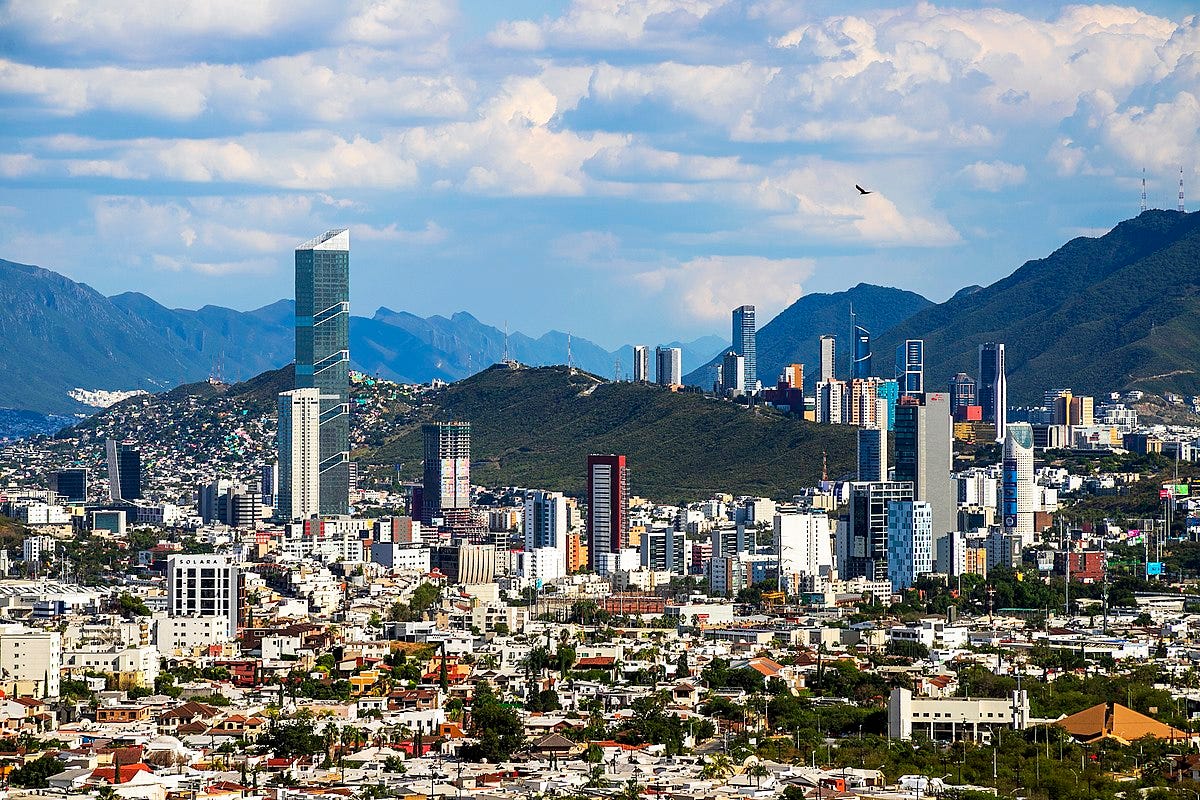
I had reason to wonder if the universe might be sending me messages about drink. Will had been to the top of our business and was previously employed by the NBC-TV affiliate in Houston, an outlet I had targeted as the location of my dream job. I was several years away from developing a skill set that might put me in that newsroom because I was laboring in radio. Less than a year earlier, I had taken a call at the station in McAllen asking about possible employment in our newsroom. I was the putative news director in a one-man operation and was working there prior to moving up the river to my first television job in Laredo. There was a broadcast-quality voice on the other end of the phone and his described resume’ made me wonder what he was doing in the Rio Grande Valley trying to land work at an AM radio station. Regardless, I had been doing split shifts to cover both the morning and afternoon drive times and I needed help, which our general manager, surprisingly had authorized.
I was determined to hire the yet unseen broadcaster unless he was unable to stand upright. There was no expectation I might have multiple applicants who could manage even the basic radio tasks of pulling wire copy and reading it over the air. When I finally introduced him to our GM Charlie, the job was offered without asking a question and the new employee was informed one of the Quonset huts under the radio tower, which Charlie owned, was available for rent. The hiring decision had nothing to do with experience or journalistic skills. The boss man wanted to get back some of the weekly minimum wage he was about to pay and needed that structure occupied with a renter. One payment of my $160 weekly wage also was used for renting one of those huts on cinder blocks, which had bright, green Astroturf for flooring.
He said his name was Jim, too, and his on-air surname was Holliday. I did not ask for more information because I immediately suspected he was running from someone or something. When he showed up for work the first day, there was the smell of whiskey about him, and I wanted to send him home but more than that I wanted to not work twelve-hour days. Listening as I drove home, Jim Too, which is what I began to call him, sounded fine, like an experienced newsman. His Quonset hut was two doors down from ours and that evening I walked down and talked to him when I saw him sitting outside on the steps staring off into the orange groves
“Hey, Jim, just wanted to drop by and tell you that you sounded great this afternoon,” I said.
“Thanks, Jim. Appreciate the kind words. Guess I should after all these years.”
I had wondered about his age. His hair was still thick but more white than gray and his face was showing signs of jowls on his cheeks.
“Well, we’re glad to have you,” I said. “I’ve needed some help for a while. Didn’t think we’d land anyone with your background.”
“I just keep screwing up.” He did not look up at me. I was silent, in no mood to take a confessional, but he had already decided I was going to hear one. “I used to have the number one TV talk show in New York City and was beating out Steve Allen. You probably can’t believe that, but it’s true. I even did sports, was the play-by-play announcer for the Cincinnati Reds, too.”
“No kiddin’? That’s amazing. How did….” He cut me off.
“I was making so much money, I bought a string of hotels down the East Coast so I could just drive from one to the next all the way to Florida. Lost it all. Every damn bit of it.”
“What happened?”
“Booze. Destroys everything once it takes control. I keep trying to stop and fail every time.”
“Let’s make this the time it happens,” I said.
“Sure, Chief. Sure.” He stood to go inside his place. “I’ll see ya tomorrow.”
I was not around when Jim Too came to work in the afternoons, but my colleagues said there was no sign he was drunk, though they thought he could have been drinking. His on-air work was fine for a couple of weeks and then I found him passed out in the long sawgrass next to his car, the door open, and the radio blasting down from our front door. I got him inside to his couch and he handed me a note in scrawled handwriting about his inability to beat a demon. I did not read the entirety because it felt too invasive of his privacy. I told him I’d see him at work the next day.
Jim Too did not show up for work ever again, but he called me about six months later from a Gulf Coast 50-thousand-watt station and asked me if I would do morning phone reports to round up the news from the Rio Grande Valley. He said it would help him establish credibility with his new employer, and seemed oblivious to the indelicate manner in which he had left his previous employer. He called me every weekday morning before my six o’clock report and I would file a two-minute piece for his newscast. The calls lasted three weeks and then he was gone, and I never again heard his voice.
When Will came out the elevator door with Barbara, teetering and singing, I had the thought he was likely the same age as Jim Too, and had the same problem. A nap had not been part of his afternoon, and Barbara shrugged in resignation. She was trying to manage the man she loved. Will was garrulous, talking like he had sobered up a little and had read an article about the French restaurant on the plaza where I had made reservations. The location was a short walk to Hidalgo Plaza and Will looked like it would not be an ambulatory issue because his young bride was holding his arm with two hands as if they had just announced their love to the world. She let go, though, momentarily, and he staggered severely to the side before she caught him again.
“Will, you gonna be okay?” I asked.
“Yeah, partner, I just like to have fun when I travel. You know, what’s life when ya ain’t partyin’?”
Ma and Mary Lou were on either side of me and they were both silent. I think Will tried to whistle like he was happy and carefree, but it sounded almost like he was spitting, and I recall Barbara hushing him. There was a shoeshine stand across from the restaurant and he had to sit for a shine and try his broken and drunken Spanish, which was not sufficiently cogent to get the young Mexican to look up from his task at hand.
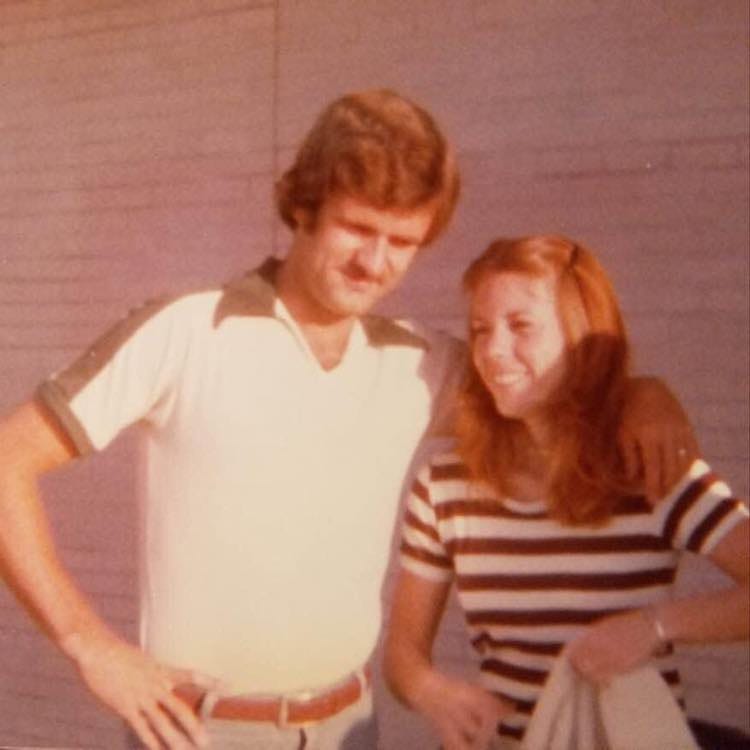
The interior of the restaurant was dark wood and minimalist lighting, clearly designed for romance. There was an abundance of white-jacketed waiters hustling through the room, and the hostess took us to the only table available, surrounded by about twenty others with people already dining. The menus were confusing with a kind of French and Spanish, but our waiter was fluent in English and helped us figure out our orders. I picked what I thought was to be the first bottle of wine for the evening and attempted to begin a normal conversation, but I was worried about Will.
“You’re gonna do great in this business, partner.” Will pointed a shaky finger at me. “I know I’ve only been around a month or so, but I can tell. I know.”
“Thanks, Will. You’ve already taught me things, and I appreciate it.”
“No, no. You understand the medium. You get it.”
“Ha, not really. You might have saved my life last week with that leaking gas truck. I wasn’t smart enough to know a leaking tanker looks the same as one that isn’t leaking, and I could have been blown to pieces.”
“Yeah, but you weren’t.”
The wine came and Will drank his glass like water. I saw Barbara place her hand over the top of his as he ordered another bottle, which arrived with our soup. I thought Will might have trouble getting a spoon to his mouth without making a mess but there was no need to worry about such a formality. He took another large gulp of wine, looked over at me, and started to point again just before his eyes rolled up in his head and he passed out face down into his gumbo. The dark roux splashed all over his white shirt and the front of Barbara’s dress.
“Oh my god, Will. Will, are you okay? Wake up.”
She lifted his face and he snorted for air and blew rice out his nose. I did not know what to do but the waiter arrived quickly with wet towels, and we started offering profuse apologies. My Ma, who had probably never imagined being in such a nice restaurant, and my wife, who had never eaten anywhere near as elegant, were both in shock.
“Son, what about Will? What are we gonna do?”
Barbara looked at me. “Will you help me get him back to the hotel? He’s blacked out from drinking all day.”
“Yeah, sure.”
Every person in the dining room felt like they were watching. I stood and put Will’s arm around my shoulder and dragged him toward the door, the toes of his shoes scraping across the floor. His shine was about to be scuffed on the sidewalk as we struggled the two blocks back to the hotel. Barbara was unable to stop apologizing and was embarrassed as I dragged her husband through the lobby, and he made guttural sounds like snoring while intermittently trying to get his feet and legs functioning. She began sobbing in the elevator and as she struggled with their room key. I got him to the bed and lifted his legs as he fell backward to the pillow.
“He’s all yours,” said. “Hope he’s okay.”
“He’s not, but this has happened before. I’m so sorry.”
“Thanks. I think we’d best cut this short and head back tomorrow. How about we meet in the lobby after breakfast and go back for the border?”
“Okay, I understand.”
I went back to the restaurant, and we had an awkward dinner on a clean tablecloth. The drive north in the morning was quiet and my mother pointed out scenes she had missed, and we made plans to go shopping in Nuevo Laredo the next day. Will said nothing and I did not ask for the wheel; he appeared sober. Barbara tried a bit of pleasant chatter, but the trip had the feel of a transcontinental run with strangers.
Will never spoke of the incident, and we became closer friends, but he did not last six months as the anchorman, and I was given the task of replacing him on the air. I came to work one day, and he was told I needed to read the news and Will was no longer working for the station. I heard nothing from him for many years, but he saw me on the air at his old TV station in Houston and called me.
“Just wanted to congratulate you, ol’ pard,” he said. “I knew you’d get here.”
“Great to hear from you, Will, and thanks for the kind words. I learned a lot from you in that short time.”
“Maybe, but I don’t think so. But listen, I wanted to mostly say good-bye.”
“You can’t talk? You gotta go already?”
“No, no. That’s not what I mean. I’ve got lung cancer. I’m finished. Few more months, possible.”
“Oh, Jesus, Will. I’m so sorry.”
“It’s okay. I did it to myself, you know. But we all gotta go sometime.”
“I reckon.”
I found myself wishing I had not heard from Will and that his disappearance had remained a mystery like my former radio colleague Jim Too. I suppose they taught me about more than broadcasting, and I ought to be grateful, but there is much I will never understand, and maybe I don’t need to. I still run the border on my motorcycle, and hike and camp near the big river from El Paso to Brownsville. But I don’t go down Mexico way anymore. Too much can happen.
And often does.